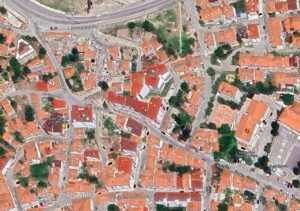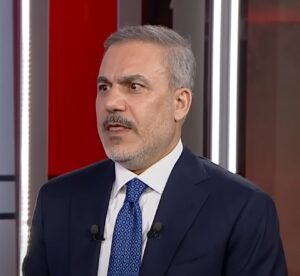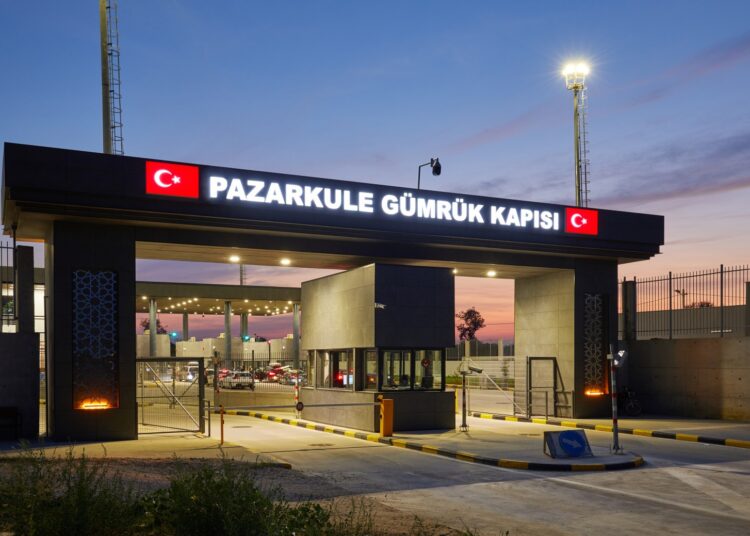Abdullah Bozkurt/Stockholm
A covert site managed by the Turkish intelligence agency, situated about 10 kilometers from the Greek border, was inadvertently exposed when a local court ordered the sale of an apartment in Turkey’s northwestern province of Edirne, only to reveal that the apartment was located within a designated security zone.
The announcement, released on July 19, 2024, by a sales clerk from the Civil Court of First Instance in Edirne, disclosed that Turkish intelligence agency MIT (Milli İstihbarat Teşkilatı) had marked the apartment deed as situated in a “special security zone” (özel güvenlik bölgesi) in June 2021.
The apartment, located on Yıldız Çeşme Street in the Ortaçukur neighborhood of Edirne, is approximately a 10-minute drive from the Pazarkule border crossing in Karaağaç, directly across from the Greek town of Kastanies.
The announcement likely stems from an estate liquidation or a property dispute among heirs that required court intervention. The Turkish court subsequently ordered the apartment’s sale through a public auction to settle the dispute. However, in the process, court clerk Mehmet Genel inadvertently revealed the secret MIT note attached to the deed during the full disclosure required for the sale.
This implies that the Turkish intelligence agency operates a covert site near the apartment building, necessitating special provisions for the clearance and transfer of the deed for any property purchased in proximity to such a site.
As part of an amendment to Law No. 2565 on Military Prohibited Zones and Security Zones, the Turkish government issued secondary legislation in the form of regulations on August 8, 2011, which for the first time granted MIT the authority to designate areas near its secret sites as special security zones.
As a result MIT is empowered to designate areas within 400 meters of its secret locations as special security zones and to impose a reservation on the deeds of all properties within these zones. Consequently, any purchase of such property requires clearance from the agency before the transfer of ownership. Moreover, no foreign individual or entity, nor any Turkish national identified as a risk by Turkish intelligence, is permitted to acquire property within these zones.

MIT requests such designations through any of the 81 provincial bodies known as Special Security Zone Assessment Committees (Özel Güvenlik Bölgesi Değerlendirme Komisyonu in Turkish). Each committee is chaired by the provincial governor and comprises representatives from MIT, the military, the gendarmerie, the police and the regional land registry and cadastral directorate. If needed, officials from other government agencies may also be invited to the meetings.
Although the regulation was intended to protect the spy agency’s secret sites from prying eyes, it also created the potential for their exposure, as demonstrated by the official court announcement regarding the sale of the apartment in Edirne. The clerk noted in the sale notice, “The property is marked in the land registry with the note: In accordance with a National Intelligence Organization [MIT] letter dated June 8, 2021 and numbered 2011/24, it is within a special security zone.”
It is not surprising that Turkish intelligence maintains a significant presence in the border province of Edirne, given its strategic importance for MIT’s clandestine operations. Over the past decade, the agency’s activities have intensified, particularly in relation to Greece, as Turkey’s relations with the EU have become increasingly strained.
Turkish court announcement regarding the public auction for the sale of an apartment located within a special security zone:
The government of President Recep Tayyip Erdogan, allied with fiercely anti-Greek partners in the ultranationalist (Milliyetçi) and neo-nationalist (Ulusalcı) blocs, has frequently used Greece as a a punching bag to advance its domestic and foreign political goals, threatening the EU with a flood of migrants through Greece and making aggressive overtures toward Greek islands in the Aegean. Erdogan has even publicly threatened Greece with invasion, suggesting that Turkish forces could suddenly arrive in the middle of the night for occupation.
Turkish intelligence, under the direction of the Erdogan government, has also been closely monitoring military sites in Greece that have been expanding — particularly those involving the US — which are said to be aimed at countering Russian aggression. Erdogan and his allies believe that US forces stationed in Greece are actually targeting Turkey rather than Russia and have frequently criticized Athens’ increasing military cooperation with the US, France and other NATO allies.
MIT plays a crucial role in advancing the Erdogan government’s political objectives, as was evidenced by a sudden surge of migrants at the Greek border in 2020, intensified spying activities in Greek territories over the past decade to identify strategic and sensitive locations, and efforts to track down Erdogan’s opponents seeking asylum in Greece. What is more, there has been a notable increase in the recruitment of informants and assets among Muslim and Turkish communities in Greece to gather intelligence.
Erdogan, who has appointed two of his closest confidants to lead the agency since May 2010, has significantly empowered MIT through a series of amendments to various Turkish laws. These changes have effectively granted MIT carte blanche to operate with near-total impunity. For instance, no criminal investigation can be initiated into any MIT officer found to have broken the law without explicit permission from the president.

This empowerment was intended to shield the agency while executing Erdogan’s political objectives, including arming jihadist groups, conducting false flag operations for social engineering, carrying out assassinations and kidnappings of opponents and torturing them at black sites. MIT was involved in efforts to drag NATO into the Syrian conflict through false flag operations; transported thousands of trucks full of arms to bolster jihadist groups aimed at ousting Bashar al-Assad and replacing him with a Muslim Brotherhood government since 2011; and led the mass purge of pro-Western officers from the Turkish military in a 2016 false flag coup attempt.
In February 2012 Turkish prosecutors secured detention warrants from a criminal court for senior MIT leaders, including then-head of the agency Hakan Fidan, who is now the foreign minister, after they failed to respond to summonses for depositions. These depositions were sought as part of a criminal investigation following police revelations that MIT was secretly involved in a series of deadly terror attacks in Istanbul.
The attacks were attributed to the Kurdistan Workers’ Party (PKK), an outlawed organization designated as a terrorist group by Turkey and its Western allies. However, a key suspect identified by the police as a perpetrator of the attacks was later revealed to be a MIT agent.
Erdogan defied the court order and asked his intelligence chief to ignore the warrant, rushing an emergency amendment to the intelligence bill through parliament to grant immunity for MIT officers in criminal investigations.

This was not the only instance where Erdogan protected the agency from criminal investigation. In 2013 the gendarmerie identified an organized crime syndicate involved in drug trafficking and smuggling stolen pickup trucks to jihadist groups in Syria. It was discovered that seven of the suspects in the syndicate were MIT employees.
In January 2014 Turkish police intercepted trucks and buses on three separate occasions, each transporting heavy arms and jihadist fighters to Syria. In 2015 a truck carrying explosives for jihadist groups was also apprehended, with the police determining that the explosives were intended for the Islamic State in Iraq and Syria (ISIS). All these cases were subsequently obstructed as the Erdogan government replaced the judges, prosecutors and police chiefs overseeing the investigations.
Today, bolstered by immunity, generous funding and extensive logistical resources, MIT serves as a crucial conduit for supporting Erdogan’s ruling Justice and Development Party (AKP) and advancing the president’s political projects, including expanded spying operations abroad.













